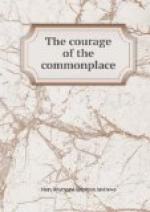“I’ve appreciated what you’ve been doing,” the even voice went on. “I talk little about personal affairs. But I’m not uninterested; I watch. I was anxious about you. You were a more uncertain quantity than Ted and Harry. Your first three years at Yale were not satisfactory. I was afraid you lacked manliness. Then came—a disappointment. It was a blow to us—to family pride. I watched you more closely, and I saw before that year ended that you were taking your medicine rightly. I wanted to tell you of my contentment, but being slow of speech I—couldn’t. So”—the iron face broke for a second into a whimsical grin— “so I offered you a motor. And you wouldn’t take it. I knew, though you didn’t explain, that you feared it would interfere with your studies. I was right?” Johnny nodded. “Yes. And your last year at college was—was all I could wish. I see now that you needed a blow in the face to wake you up—and you got it. And you waked.” The great engineer smiled with clean pleasure. “I have had”—he hesitated—“I have had always a feeling of responsibility to your mother for you—more than for the others. You were so young when she died that you seem more her child. I was afraid I had not treated you well—that it was my fault if you failed.” The boy made a gesture—he could not very well speak. His father went on: “So when you refused the motor, when you went into engineer’s camp that first summer instead of going abroad, I was pleased. Your course here has been a satisfaction, without a drawback—keener, certainly, because I am an engineer, and could appreciate, step by step, how well you were doing, how much you were giving up to do it, how much power you were gaining by that long sacrifice. I’ve respected you through these years of commonplace, and I’ve known how much more courage it meant in a pleasure-loving lad such as you than it would have meant in a serious person such as I am—such as Ted and Harry are, to an extent, also.” The older man, proud and strong and reserved, turned on his son such a shining face as the boy had never seen. “That boyish failure isn’t wiped out, Johnny, for I shall remember it as the corner-stone of your career, already built over with an honorable record. You’ve made good. I congratulate you and I honor you.”
The boy never knew how he got home. He knocked his shins badly on a quite visible railing and it was out of the question to say a single word. But if he staggered it was with an overload of happiness, and if he was speechless and blind the stricken faculties were paralyzed with joy. His father walked beside him and they understood each other. He reeled up the streets contented.
That night there was a family dinner, and with the coffee his father turned and ordered fresh champagne opened.
“We must have a new explosion to drink to the new superintendent of the Oriel mine,” he said. Johnny looked at him surprised, and then at the others, and the faces were bright with the same look of something which they knew and he did not.




